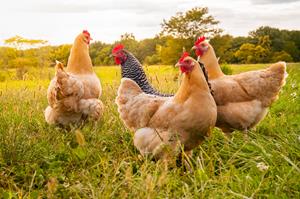Campylobacter is a major foodborne pathogen in many parts of the world and its ensuing illness, campylobacteriosis, is the most frequently reported bacterial foodborne illness in Canada, outnumbering the reported cases of Listeria, Salmonella, and Shiga-toxigenic Escherichia coli infections combined.
VANCOUVER, British Columbia, Jan. 22, 2020 (GLOBE NEWSWIRE) -- Campylobacter is a major foodborne pathogen in many parts of the world and its ensuing illness, campylobacteriosis, is the most frequently reported bacterial foodborne illness in Canada, outnumbering the reported cases of Listeria, Salmonella, and Shiga-toxigenic Escherichia coli infections combined.
Campylobacter can survive in many environments including soil, manure, aquatic sources. These bacteria are also present in many farm and wild animals, with the pathogen transmission occurring to humans through the consumption of undercooked meat and tainted milk. The most common route for human infections is thought to be through poultry consumption. Understanding this microbe in the context of BC’s agrifood system, and poultry production specifically, requires modern genomic tools and approaches to better monitor, prevent and control Campylobacter-related food contamination.
Genome BC has invested in a project, “One Health” Syst-Omics approach to reduce Campylobacter in agrifood chain, led by the University of British Columbia’s Dr. Xiaonan Lu and Dr. William Hsiao from the BC Centre for Disease Control. Adopting a “One Health” approach, the project aims to develop novel characterization, detection and biocontrol tools to reduce the impact of Campylobacter in BC’s agrifood chain.
High risk Campylobacter molecules from human clinical and environmental samples will inform the development of a user-friendly, field deployable device to identify tainted products in real time. This low-cost test will aid government and industry stakeholders with Campylobacter surveillance strategies for food and environmental sources of contamination. Another aspect of the project, bacterial viruses, called bacteriophages, will be isolated and characterized for their ability to kill Campylobacter specifically. The most promising, food safe bacteriophages will be integrated into a novel biodegradable food packaging material for food processors to reduce the presence of Campylobacter bacteria in raw poultry products.
“Our work will offer significant social and economic benefits to Canada including better Campylobacter surveillance and detection in environment and food systems,” says Dr. Lu, an Associate Professor, Food Science at UBC.
“Food safety is one of our most significant challenges,” says Dr. Lisey Mascarenhas, Sector Director, Agrifood and Natural Resources at Genome BC. “This work will make inroads in protecting human health as well as offering new tools to BC’s poultry industry.”
This project was funded through Genome BC’s Sector Innovation Program which is specifically targeted for bringing industry and academia together to find solutions for sector challenges. The project also received funding through Genome Canada’s Regional Priorities Partnership Program (RP3).
About Genome British Columbia:
Genome British Columbia leads genomics innovation on Canada’s West Coast and facilitates the integration of genomics into society. A recognized catalyst for government and industry, Genome BC invests in research, entrepreneurship and commercialization in life sciences to address challenges in key sectors such as health, forestry, fisheries and aquaculture, agrifood, energy, mining and environment. Genome BC partners with many national and international public and private funding organizations to drive BC’s bioeconomy. www.genomebc.ca
Contact:
Jennifer Boon
Communications Manager, Sectors
Genome BC
Mobile: 778.327.8374
Email: jboon@genomebc.ca
@genomebc #genomebc
Photos accompanying this announcement are available at
https://www.globenewswire.com/NewsRoom/AttachmentNg/c9fa67ec-df70-4829-a138-de4bbd1d5074
https://www.globenewswire.com/NewsRoom/AttachmentNg/715ca348-058e-42ca-a33e-a192c4168555
The BC chicken industry is a significant to the BC economy
This work will make inroads in protecting human health as well as offering new tools to BC’s poultry industry
There are 325 licensed chicken growers in BC


